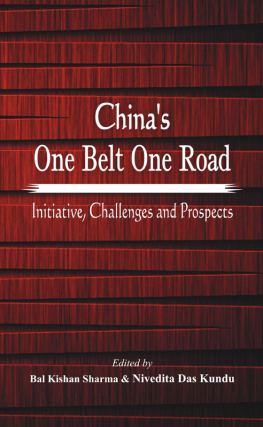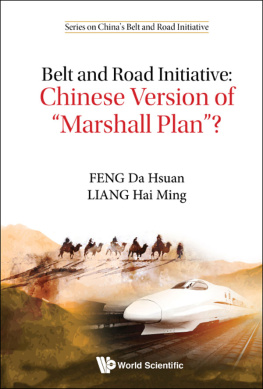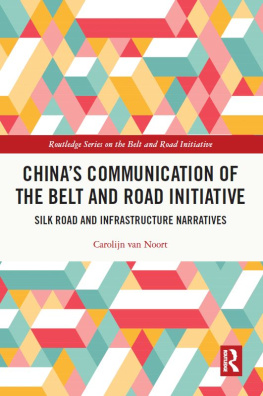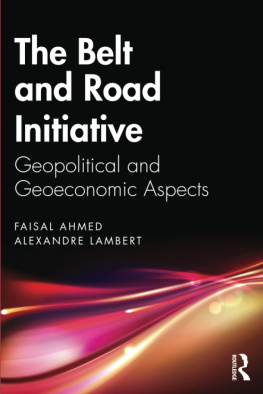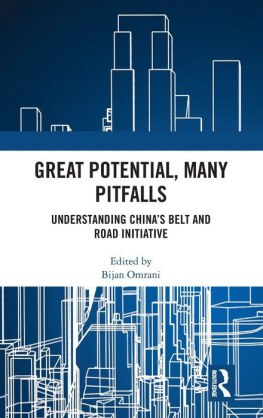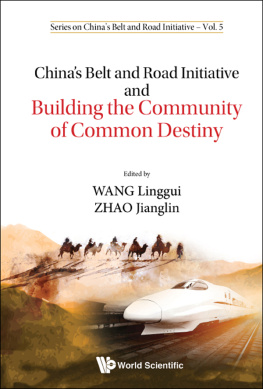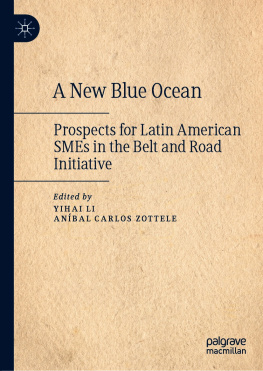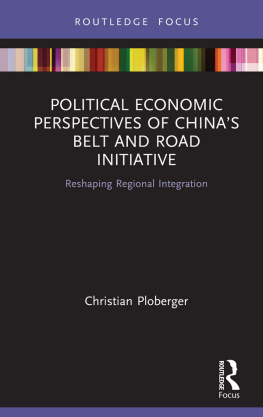Chinas One Belt One Road
Initiative, Challenges and Prospects
Chinas One Belt One Road
Initiative, Challenges and Prospects
Edited By
Bal Krishan Sharma & Nivedita Das Kundu
United Service Institution of India
New Delhi
in collaboration with
Sichuan University
Chengdu
Published by
Vij Books India Pvt Ltd
(Publishers, Distributors & Importers)
2/19, Ansari Road
Delhi 110 002
Phones: 91-11-43596460, 91-11-47340674
Fax: 91-11-47340674
e-mail:
Copyright 2016, United Service Institution of India, New Delhi
ISBN:978-93-85563-59-1 (Hardback)
ISBN:978-93-85563-60-7 (ebook)
All rights reserved.
No part of this book may be reproduced, stored in a retrieval system, transmitted or utilised in any form or by any means, electronic, mechanical, photocopying, recording or otherwise, without the prior permission of the copyright owner. Application for such permission should be addressed to the publisher.
Disclaimer
Views expressed are of the authors and do not necessarily reflect the views of the USI or SCU or of the Government of Republic of India or Government of Peoples Republic of China.
Preface
This Book is the outcome of a Joint research conducted by the scholars from United Service Institution of India (USI), Center for Strategic Studies and Simulation (CS3) and Sichuan University (SCU), Faculty of Social Development and Western China Development Studies,(FSDWCDS) on the topic Chinas One Belt One Road: Initiative, Challenges and Prospects In the recent years, the Chinese side has accorded a very high priority to One Belt One Road, (OBOR) in its economic and foreign policy matrices. The aim of this joint-research publication is to bring out both Indian and Chinese perspectives in one collection. Therefore, the chapters in this book narrate various viewpoints, opportunities, concerns and challenges of the OBOR and provide both Indian and Chinese perspective of the subject. A key idea that has emerged from this volume is that national development goals and interest of India and China should be addressed in a mutually supportive manner. Further, there is a need to show respect, sensitivity, interest for each others aspirations. The chapters also emphasized the concern that unilateral decisions may not auger well in the connectivity projects as it interlinks nations. Hence, collaborative and consultative approaches tend to work better. This is more so, in Asia with the absence of agreed security architecture. This makes transparency in such a project desirable with constructive deliberations on choice of specific routes, on the alignment, approaches, providing rationale behind choices. Being transnational initiative with a large scope, issues related to the international norms and on legal concerns needs to be jointly examined and mutually agreed to.
The research queries addressed in the Chapters of these volume articulate contours of OBOR as proposed by the Chinese side and examine Indias point of view on OBOR. This Book is therefore divided into two sections. The first section describes the One Belt One Road: Chinas Perspective by the academics from SCU and the second section deals with One Belt One Road: Indias Perspective, by the scholars from USI.
It is expected that this Book will fill in existing gap in the literature on this subject and provide useful inputs to policy planners. The readers will find important information on both Chinese and Indian perspectives and respective positions on issues and concerns related to Chinas OBOR initiative.
It is important to note that the discussions on connectivity should address not only the physical infrastructure aspects but also the institutional, digital, financial, as well as commercial aspects in detail as there is a need to provide clarity on how the Institutions are going to coalesce in initial building and subsequent management of this ambitious connectivity and transportation project. These demand statecraft and sagacity of a unique order to reconcile different point of views.
China understandably has mooted Indian participation in OBOR initiative. A dispassionate study of this proposal highlights its potential to integrate the Asian economic landscape. However, the contour of OBOR in regard to politico-economic and security aspects merit a greater examination and debate. Prima facie there are areas of convergence and divergence in Indian and Chinese perspectives on the subject, which need to be explained in the light of contemporary and vexed bilateral relations.
On behalf of USI, I express my sincere gratitude to the scholars and academics from USI and SCU for enthusiastically collaborating in this joint publication and for providing their valuable inputs and penning down their precious thoughts and understanding on the topic of OBOR.
Lt. Gen. P.K. Singh (Retd.)
Director United Service Institution of India, New Delhi
Acknowledgement
This Book is part of a joint project between United Service Institution of India (USI) and Sichuan University, (SCU) Chengdu, China, under the Memorandum of Understanding (MOU) agreement signed by both the Institutes. While working on this joint project the authors from both India and China supported each other for collecting research material, providing information and inputs through discussions and conferences.
We sincerely thank Director USI, Lt Gen PK Singh for his unwavering support and encouragement. We also take this opportunity to thank USI colleagues who was always there with their supportive and cooperative attitude for successfully conducting this project.
We also take this opportunity to thank Prof. Yang Minghong and Dr. Huang Yunsong from SCU for conducting sincere research on the topic and for their cooperative approach. They shared some insightful and thought-provoking ideas in their Chapters.
Last but not the least; we would like to take this opportunity to thank USIs administrative and academic staff of the Center for Strategic Studies and Simulations (CS3) for their encouragement and support. It is entirely due to the whole-hearted cooperation and assistance by both the Indian and Chinese side this volume has taken the present shape.
New Delhi
Bal Krishna Sharma & Nivedita Das Kundu
Contributors
Nivedita Das Kundu, PhD, in International Studies, is Senior Research Advisor with United Service Institution of India, New Delhi. Her research expertise focuses on geopolitics, geo-economics, foreign policy, multilateral organisations, border issues, migration and strategic dimensions of security. Dr. Nivedita has worked extensively on Silk Route and transport corridor issues and concerns. She has contributed widely and worked on her research expertise with prestigious International Universities and research Institutes/Think Tanks in India and abroad. She has authored and edited books, Monographs and published research articles on her area of research.
Yang Minghong, PhD, in Economics, is Professor, Executive Director, Faculty of Social Development and Western China Development Studies, Sichuan University, Chengdu. Prof. Yang is a leading Chinese scholar on China Studies, Tibetan Studies, and South Asian Studies. His current work is covering Regional Economics, Borderlands Studies, Tibet Development, and exiled-Tibetan issue. He has contributed extensively in the international academic circle.




